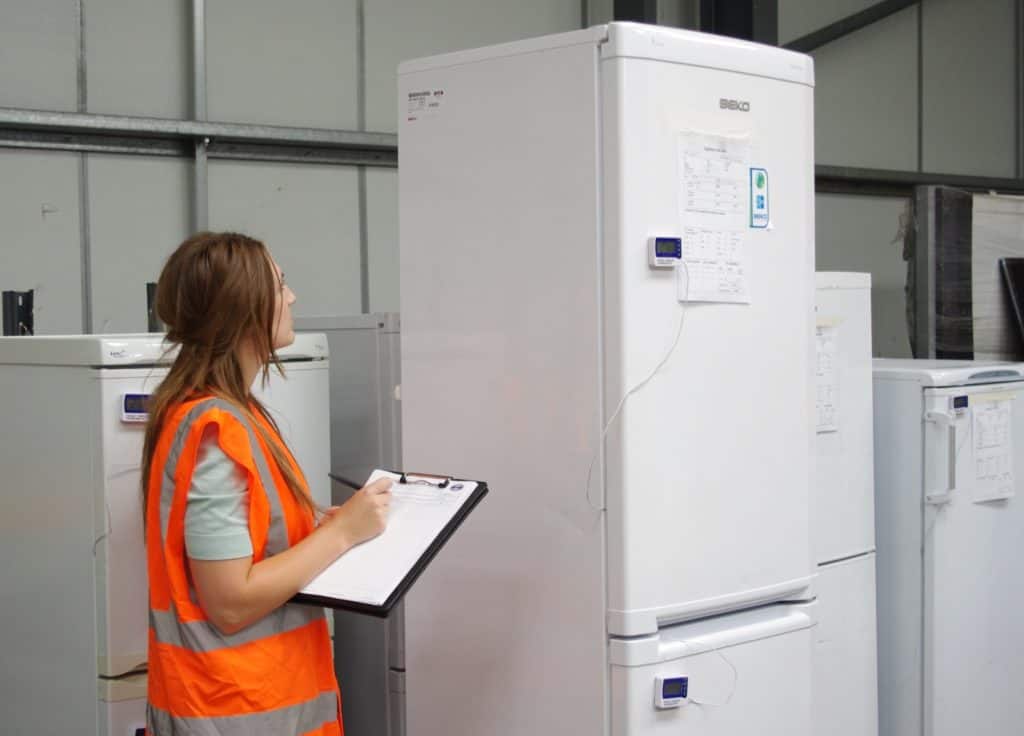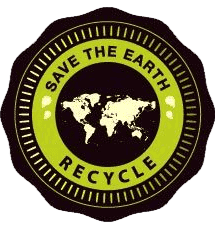Certain appliances can be hazardous to the environment. Refrigerated appliances – like fridges, freezers, and air conditioners – can be particularly problematic. That’s why you need to practice safe disposal techniques when getting rid of your fridge.
We, at Eagle Dumpster Rental, get a lot of questions about safely disposing of appliances – including why appliances can be dangerous and how you can safely get rid of your unwanted appliances.
What Are the Environmental Concerns?
There are a number of reasons why we don’t throw out old appliances. We’ve listed some of the most important reasons below:
Refrigerants like CFCs and HCFCs
Refrigerated appliances made before 1995 typically contain chlorofluorocarbon (CFC) refrigerant. This refrigerant was commonly used in old fridges and freezers but is no longer used due to environmental concerns.
Meanwhile, many modern window air-conditioning units and dehumidifiers contain hydrochlorofluorocarbon (HCFC) refrigerant.
Both CFCs and HCFCs are ozone-depleting substances, or ODS. If released into the environment, these substances will destroy the ozone layer. The ozone layer of the planet is what protects us from the harmful radiation of the sun – so it’s pretty important.

Making things worse, CFCs and HCFCs are potent greenhouse gases. When they’re released into the air, they contribute to global climate change.
You may think that your fridge is new and doesn’t need special disposal techniques. That’s not true!
Most fridges and freezers made after 1995 use hydrofluorocarbon (HFC) refrigerants, as do most A/C units made since 2010. However, HFCs still need to be disposed of in a special way: they no longer harm the ozone layer, but they still contribute to greenhouse gases in the atmosphere.
Foam
Many fridges and freezers made before 2005 are insulated with foam containing ozone-depleting substances (ODS). Like CFCs and HCFCs, these contribute to ozone depletion and climate change.
Most fridges and freezers manufactured since 2005 contain foam blowing agents that are friendly to the ozone and climate. Meanwhile, air conditioners and dehumidifiers have no foam.
Other Hazardous Components
Foam and CFCs are just two of the problematic components within refrigerated appliances. These appliances can contain a number of other problematic materials, including used oil, polychlorinated biphenyls (PCBs), and mercury. Some fridges and freezers made before 2000 contain mercury, and appliances made before 1979 contain PCB capacitators.
When improperly disposed, these materials can leech into groundwater from the landfill. Anyone exposed to these materials can also experience severe medical problems, including skin, eye, or respiratory irritation. Mercury, meanwhile, accumulates in the tissues of plants and animals and can eventually lead to neurological damage.
For all of these reasons, it’s crucial that you dispose of appliances in a safe way at an approved facility.
How to Safely Dispose of An Appliance
Now that you’ve learned the dangers of throwing out an appliance, it’s time to learn how to safely dispose of that appliance. Here are some tips to help you get started.
Check for Local Bounty or Return Programs
Some utility companies or government recycling organizations operate bounty programs. These bounty programs will pay appliance owners to drop off old appliances. If you have an old or dangerous appliance, then you might get $20 for it from a local utility company. Check for local bounty or return programs in your area. Not only will you avoid landfill fees or recycling fees – but you’ll actually get paid to get rid of your appliance.
Check with Local Retailers About Appliance Pickup and Disposal Services
If you’re getting rid of an old fridge or freezer, then you may be replacing it with a newer model. Some appliance retailers will offer pickup and disposal services. When technicians arrive with your new appliance, they’ll take away your old appliance free of charge.
Look for Recycling Services with your Local Municipality
If you can’t find bounty programs, then check with your municipality for any recycling services. Many municipalities operate special electronic recycling centers where you can dispose of old appliances.
Sometimes, it’s as simple as visiting a special section at your local landfill. In other cases, you might need to make an appointment for city waste management officials to pick up your appliances.
Some municipalities are particularly annoying about appliance collection: they’ll require you to hire an appliance specialist who can remove the refrigerant before the unit is disposed. Then, you’ll be able to take the appliance to the landfill.
Look for Local Recycling Organizations
If you’re having trouble finding a city program that gets rid of appliances, then consider looking for other organizations. The EPA runs the Responsible Appliance Disposal (RAD) program, for example, which connects you with local organizations that provide small discounts on appliance removal services.
Contact a Waste Management Company
Many waste management companies will get rid of your old appliance for a fee. If not, they’ll know where you can take your old appliance when you no longer need it.
How Much Does It Cost to Get Rid of an Old Refrigerated Appliance?
Getting rid of an old refrigerated appliance doesn’t have to be expensive.
In some cities, it’s totally free. Cities want to encourage citizens to safely dispose of their dangerous appliances, so they offer the service for free.
In other cities, you’ll need to pay a small recycling fee of $10 or $50 to dispose of the old appliance.
Some regions are starting to charge recycling fees when you buy electronics or appliances. You might see a recycling fee of $10 added to your new TV purchase, for example. This goes towards safe recycling of your TV, and it means you won’t have to pay a recycling fee when you – or the final owner of the TV – needs to dispose of it.
Conclusion
Ultimately, safe disposal of refrigerated appliances is crucial for the environment. Appliances – whether they’re old or new – contain dangerous ingredients that can leech into the soil, deplete the ozone layer, and contribute to climate change. For all of these reasons and more, it’s crucial you contact an appliance recycling or removal organization in your area.
